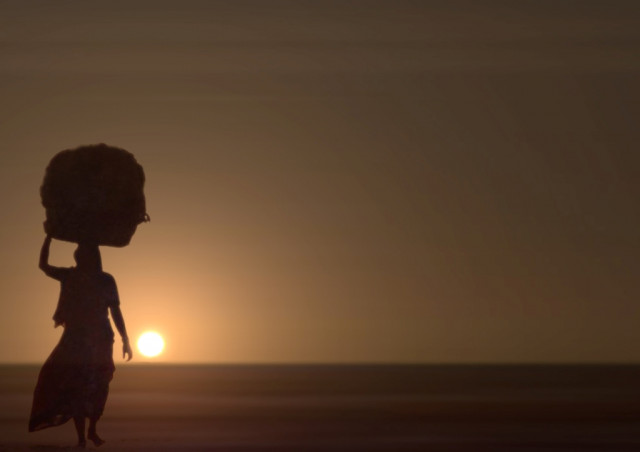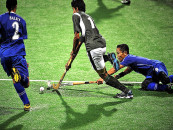International Day of Rural Women: The road less travelled
It’s time the importance of rural women in development is recognised.

It’s time the importance of rural women in development is recognised. PHOTO: FILE
Handling large animals is not an easy task. More than physical strength, it requires skill, something 19-year-old Sadaf Khalid of Moranwala village near Lahore learned four months ago in a capacity-building training.
Sadaf could not have imagined being able to provide for her family six months ago. Shortly after her father’s death, Sadaf, who aspires to be enrolled at a college soon, helped her mother pay off the debt her father had. She also contributed to her two younger brothers’ school fees. Besides, she saved Rs22,000, which is an achievement she is deservingly proud of.
An expert of sorts, young Sadaf is now a UVAS (University of Veterinary and Animal Sciences) certified livestock extension worker who is skilled in diagnosing livestock diseases and infections, administering oral and injection vaccines and increasing production and general care. This she did after a month-long livestock management course by Nestle Pakistan, followed by follow-up meetings and fortnightly reviews.
Sadaf is one of Pakistan’s dynamic rural women who make up over 80 percent women in the country’s workforce.
Addressing the world on account of the International Day of Rural Women observed on October 15, United Nations Secretary General Ban Ki-moon last year said that empowering rural women was crucial for ending hunger and poverty.
Rural women produce much of the world’s food, care for the environment and help reduce the risk of disaster in their communities.
In Pakistan, a few companies have realised the need to tap into the reservoir of the positive workforce of rural women as part of corporate social responsibility. The company has been working with different partner organisations, including United Nations Development Programme (UNDP), Swiss Agency for Development and Cooperation (SDC) and Dairy and Rural Development Foundation (DRDF), to equip women in the rural areas with skills to improve availability of livestock healthcare facilities for dairy farmers, create gender empowerment and boost income generation for rural communities. The impact seen is encouraging.
Dr Maria Mubarak, field operations manager with the DRDF-Dairy Project, says extension workers under the dairy project can make up to Rs30,000 per month. Dr Maria says the project has met 70 per cent of its target so far.
More success stories
Bahrawan Mai is one of the beneficiaries of the Awaz Foundation’s Road Maintenance Team (RMT) project working in Multan, Vehari, Rajanpur and Muzaffargarh districts. The project is a collaborative effort of the foundation and Canadian International Development Authority (CIDA).
Bahrawan Mai and her group members maintain earthen roads in their villages and are paid Rs5,600 fortnightly by the Care International. Of this amount, Rs1,100 per month is being deposited directly in their savings accounts.
In addition to this, women under the foundation’s Women Economic Empowerment Community Infrastructure Improvement Programme are trained in health and hygiene, human rights and gender development and business and entrepreneurship development.
It’s the savings from the RMT project and learning from the business and entrepreneurship development sessions that have enabled women like Bahrawan to set up their own small businesses, says Awaz Foundation’s Communication Officer Danish Batool Zaidi.
Zaidi emphasises that rural women make up 60 per cent of Pakistan’s women, and stresses the need for introducing them to entrepreneurship opportunities.
“We have had cases where women in these group businesses saved up to Rs150,000. These are mostly women who are sole earners in their families.”
Under the Community Uplift Programme, Zaidi says elderly women in the rural areas are given loans to set up small businesses. 10 per cent of the amount is returned to the foundation every month.
Kashf Foundation provides short-term loans between Rs25,000 and Rs60,000 that are to be returned over a year’s instalments.
Nasir Mumtaz, gender empowerment and advocacy assistant manager at the Kashf Foundation, says the foundation provides business loans to women to help them improve their economic status by building their entrepreneurship and financial management skills.
Government role
Agha Ali Jawad, the National Rural Support Programme (NRSP) general manager in Islamabad, claims that the government has been active in providing support to women in rural areas. According to him, the most difficult step of such projects in the rural areas was to organise (gather) the women.
He says this year, under NRSP’s Microfinance Enterprise Development Programme, 20,000 women in rural areas got enrolled in beautician course. “A number,” he said, “that was a [pleasant] surprise for him.”
The working woman
11.1 million of the 13.29 million women in workforce in Pakistan are from the rural areas. The breakdown is as follows:
• 7.9m in Punjab
• 1.8m in Sindh
• 1.2m in K-P
• 0.2m in Balochistan
Of these, 8.3 million are skilled agriculture and fishery workers.
Source: A UN report on Dynamics of Female Labour Force (2010-2011)
Published in The Express Tribune, October 15th, 2013.



















COMMENTS
Comments are moderated and generally will be posted if they are on-topic and not abusive.
For more information, please see our Comments FAQ